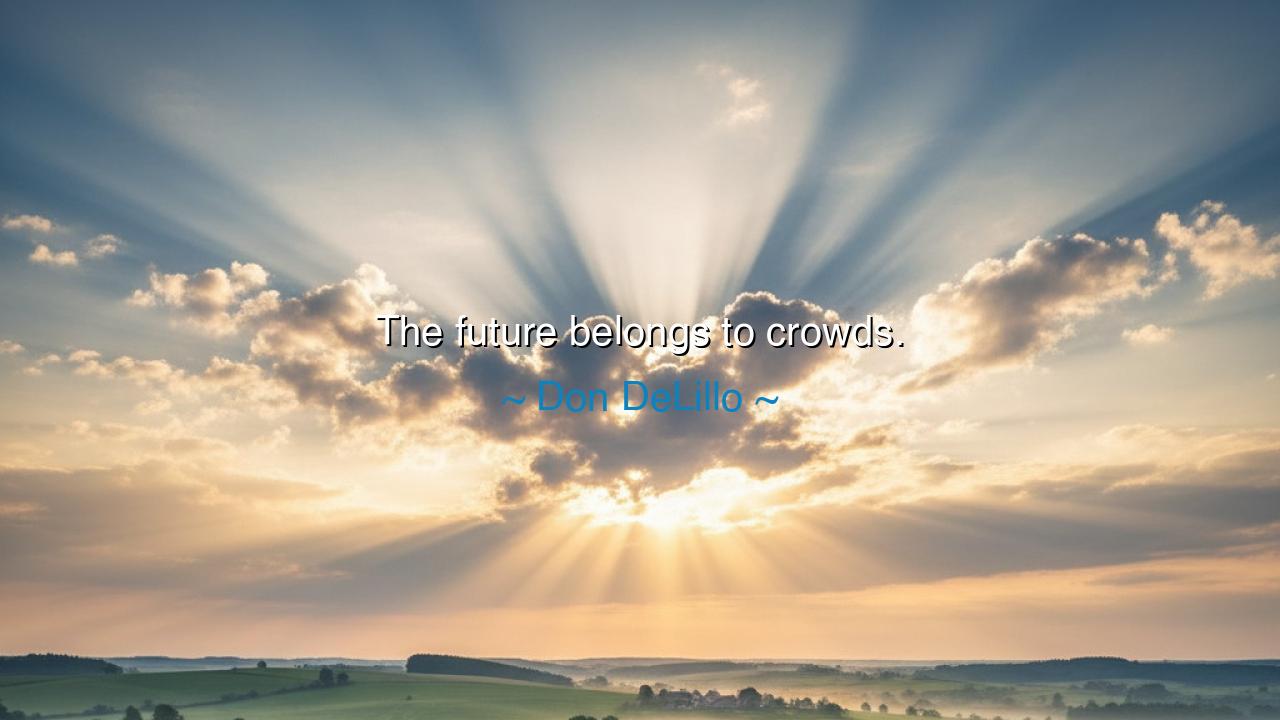
The future belongs to crowds.






"The future belongs to crowds." With these words, Don DeLillo speaks to a deep, almost prophetic truth about the direction of humanity in an era dominated by technology, mass media, and the interconnectedness of global populations. The idea that the future belongs to the crowds reveals an unsettling, yet inevitable, shift in which the collective will, the public consciousness, and the power of the masses have taken on an unprecedented role in shaping the trajectory of civilization. It is no longer the solitary leader, the philosopher, or the monarch who steers the course of history, but the powerful, often chaotic, energy of the crowd.
In the ancient world, the importance of the collective was often recognized, especially in the democratic structures of ancient Greece. Athens, with its direct form of democracy, depended on the participation of the people to make decisions that shaped their future. While Plato often warned about the dangers of mob rule, recognizing that the crowd could be swayed by the whims and passions of the moment, he also understood the potential power of the collective mind when it was engaged in thoughtful discourse. The Athenian assembly was the epitome of a system where the crowd had both power and responsibility. Yet, the warning was clear: the strength of the crowd was often shaped by its understanding—or lack thereof—of the truth.
DeLillo’s statement, however, speaks to a modern phenomenon—one that is less concerned with the deliberative power of a thinking populace and more with the swarm mentality driven by media, pop culture, and the internet. It is in this digital age that the crowd is both omnipresent and impersonal, fueled by an incessant stream of information, soundbites, and images that can unite or fragment societies in a heartbeat. Just as the Roman Empire relied on the masses to maintain its power—using the bread and circuses to distract and control the people—so too does modern society find itself shaped by the energy and whims of crowds, albeit in different forms. The tools may have changed, but the influence of the collective remains the same: humanity, in its connectedness, has never been more vulnerable or powerful.
Consider, for example, the Arab Spring—a series of uprisings in the early 2010s that were fueled largely by social media and the collective mobilization of citizens. It was the crowd—unified through digital platforms—who overthrew oppressive regimes. The power of technology made it possible for voices to be heard that otherwise would have been silenced, turning an idea into a movement that spanned nations and led to political change. In this moment, the future seemed to belong to the people—the crowd—and their collective will for freedom. Yet, as history has shown us, while the crowd has the power to bring about change, the aftermath often reveals that the future is not always easily shaped. The masses may demand change, but what follows can be just as uncertain and filled with its own challenges.
This moment of revolution also speaks to the fragility of the crowd's influence. The French Revolution, for example, demonstrated the immense power of the people to topple a monarchy, yet in its aftermath, the chaos of the revolution led to a new kind of despotism under Napoleon Bonaparte. The crowd’s power to change history is undeniable, but the consequences of that power are often complex, and the future remains uncertain. What DeLillo implies is that in this new age, it is no longer a matter of a single individual or a small group making decisions; instead, it is the collective action of the many that will dictate the course of events.
The lesson in DeLillo’s statement, then, is one of recognition and responsibility. The future is no longer in the hands of the few; it lies in the power of the masses, shaped by the choices and actions of the crowd. In this world, we must ask ourselves: what kind of crowd will we be? Will we be a mindful crowd, one that understands the weight of its influence, its ability to shape the future? Or will we be swayed by the noise and chaos, swept along without thought or direction, as many crowds have been throughout history?
In our own lives, we must take heed of this dynamic. We live in an age where social media, global communication, and instant connectivity give us all a voice, and in doing so, we must recognize our role in the collective. Individual action still matters, but the power of the crowd can no longer be ignored. Our choices, our values, and our ability to unite for a common cause will determine what the future holds. Act with purpose, be mindful of the power of collective will, and always strive to shape the future with wisdom, compassion, and a clear understanding of the true nature of the crowd. The future belongs to crowds, yes—but it is up to us to ensure that this collective power moves toward justice, progress, and positive change for all.






AAdministratorAdministrator
Welcome, honored guests. Please leave a comment, we will respond soon